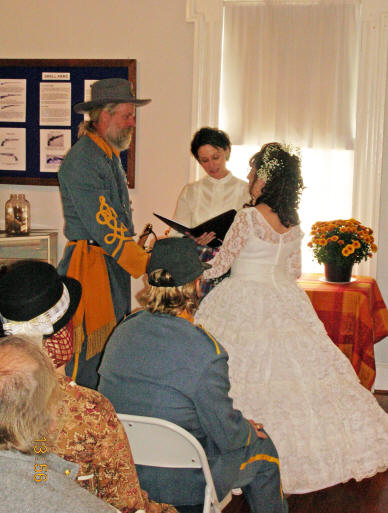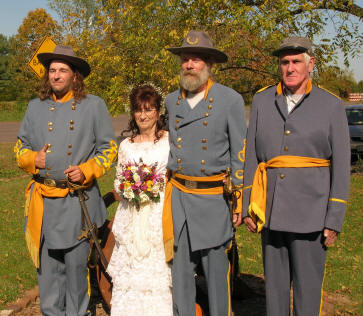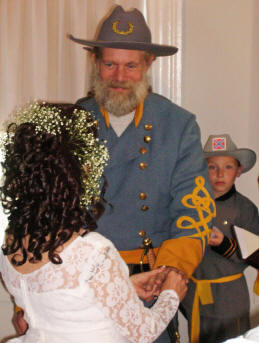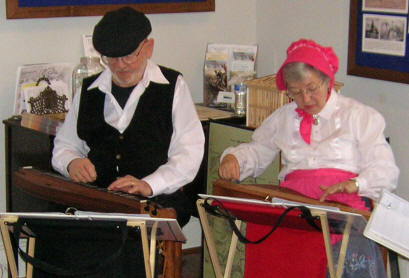|
 The ladies
in hooped skirts and cavalry officers paced nervously in the front
parlor of the Graffiti House but the scene wasn't set during the
Civil War. The ladies
in hooped skirts and cavalry officers paced nervously in the front
parlor of the Graffiti House but the scene wasn't set during the
Civil War.
 Last
Saturday, three generations of David Guinns gathered for the first
time in many years in the historical house that had once belonged to
their family. The elder Guinn, the previous homeowner, came from
Fairfax to celebrate the marriage of his son, David, the boy who
discovered the Graffiti on the house's walls hidden behind years of
plaster and paint. Last
Saturday, three generations of David Guinns gathered for the first
time in many years in the historical house that had once belonged to
their family. The elder Guinn, the previous homeowner, came from
Fairfax to celebrate the marriage of his son, David, the boy who
discovered the Graffiti on the house's walls hidden behind years of
plaster and paint.
As
music from a dulcimer quartet ensemble wafted through the 150 year
old building, a young ring bearer dressed as a Confederate soldier
lead the wedding procession. He was followed by the Matron of Honor,
and the bride, Barbara Shellito, both adorned in beautiful lace
dresses with billowing hoop skirts ― one in ivory and the other in
pale blue. Barbara was presented to her future husband, David, by
her brother.
These
men, the best man and the military guard were all dressed as
Confederate cavalry officers. The ceremony was officiated by Michele
O'Halloran. A wedding cake prepared by Knakal's and cider was served
to guests by Brandy Station Foundation volunteers also dressed in
period attire. Approximately forty family and friends observed the
ceremony, including a few tourists who joined in the ceremony. (The
Graffiti House is always open to the public on Saturdays from 11-4.)
 The elder
David Guinn reminisced about the days when his father, another David
Guinn, operated an antique store in the building together with Mr.
Hitt. A younger David Guinn, the groom, recalled his amazement when
he revealed the name of JEB Stuart on the walls of the house. He
used a glass shard to remove old layers of wall paper and paint. The
youngest David Guinn remembered the day his father was lowered into
a dry well, looking for Civil War artifacts. The disappointed boy
was not aware that the real treasure was in plain view ― the Civil
War charcoal writings covering the walls of the house. The elder
David Guinn reminisced about the days when his father, another David
Guinn, operated an antique store in the building together with Mr.
Hitt. A younger David Guinn, the groom, recalled his amazement when
he revealed the name of JEB Stuart on the walls of the house. He
used a glass shard to remove old layers of wall paper and paint. The
youngest David Guinn remembered the day his father was lowered into
a dry well, looking for Civil War artifacts. The disappointed boy
was not aware that the real treasure was in plain view ― the Civil
War charcoal writings covering the walls of the house.
 Music
for the wedding was provided by four mountain dulcimers, a form of
music popular during the Civil War as its sound volume was
well-suited to small home gatherings in the parlor. The instruments
were played by a group called the Wilderness Run Players including
Jan Moore, Sandy Wemmerus and two Directors of the Brandy Station
Foundation, Bob and Shirley Pfile. Music
for the wedding was provided by four mountain dulcimers, a form of
music popular during the Civil War as its sound volume was
well-suited to small home gatherings in the parlor. The instruments
were played by a group called the Wilderness Run Players including
Jan Moore, Sandy Wemmerus and two Directors of the Brandy Station
Foundation, Bob and Shirley Pfile.
Graffiti
House volunteer, Della Edrington, stated she never thought a wedding
coordinator would be among her duties at the house. Mrs. Edrington
is leading the BSF effort to restore the Graffiti House.
|